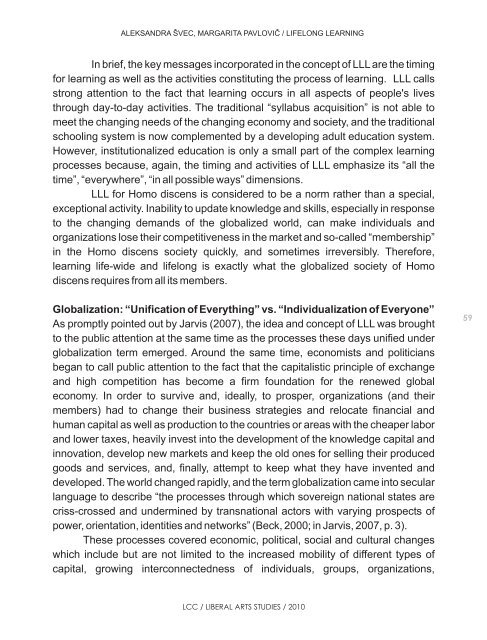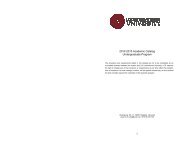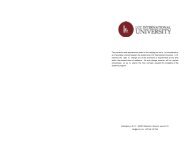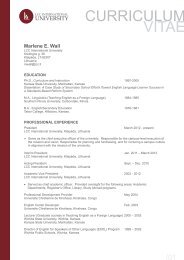lcc liberal arts studies / 2010 volume iii - LCC International University
lcc liberal arts studies / 2010 volume iii - LCC International University
lcc liberal arts studies / 2010 volume iii - LCC International University
You also want an ePaper? Increase the reach of your titles
YUMPU automatically turns print PDFs into web optimized ePapers that Google loves.
ALEKSANDRA ÐVEC, MARGARITA PAVLOVIÈ / LIFELONG LEARNING<br />
In brief, the key messages incorporated in the concept of LLL are the timing<br />
for learning as well as the activities constituting the process of learning. LLL calls<br />
strong attention to the fact that learning occurs in all aspects of people's lives<br />
through day-to-day activities. The traditional “syllabus acquisition” is not able to<br />
meet the changing needs of the changing economy and society, and the traditional<br />
schooling system is now complemented by a developing adult education system.<br />
However, institutionalized education is only a small part of the complex learning<br />
processes because, again, the timing and activities of LLL emphasize its “all the<br />
time”, “everywhere”, “in all possible ways” dimensions.<br />
LLL for Homo discens is considered to be a norm rather than a special,<br />
exceptional activity. Inability to update knowledge and skills, especially in response<br />
to the changing demands of the globalized world, can make individuals and<br />
organizations lose their competitiveness in the market and so-called “membership”<br />
in the Homo discens society quickly, and sometimes irreversibly. Therefore,<br />
learning life-wide and lifelong is exactly what the globalized society of Homo<br />
discens requires from all its members.<br />
Globalization: “Unification of Everything” vs. “Individualization of Everyone”<br />
As promptly pointed out by Jarvis (2007), the idea and concept of LLL was brought<br />
to the public attention at the same time as the processes these days unified under<br />
globalization term emerged. Around the same time, economists and politicians<br />
began to call public attention to the fact that the capitalistic principle of exchange<br />
and high competition has become a firm foundation for the renewed global<br />
economy. In order to survive and, ideally, to prosper, organizations (and their<br />
members) had to change their business strategies and relocate financial and<br />
human capital as well as production to the countries or areas with the cheaper labor<br />
and lower taxes, heavily invest into the development of the knowledge capital and<br />
innovation, develop new markets and keep the old ones for selling their produced<br />
goods and services, and, finally, attempt to keep what they have invented and<br />
developed. The world changed rapidly, and the term globalization came into secular<br />
language to describe “the processes through which sovereign national states are<br />
criss-crossed and undermined by transnational actors with varying prospects of<br />
power, orientation, identities and networks” (Beck, 2000; in Jarvis, 2007, p. 3).<br />
These processes covered economic, political, social and cultural changes<br />
which include but are not limited to the increased mobility of different types of<br />
capital, growing interconnectedness of individuals, groups, organizations,<br />
<strong>LCC</strong> / LIBERAL ARTS STUDIES / <strong>2010</strong><br />
59






